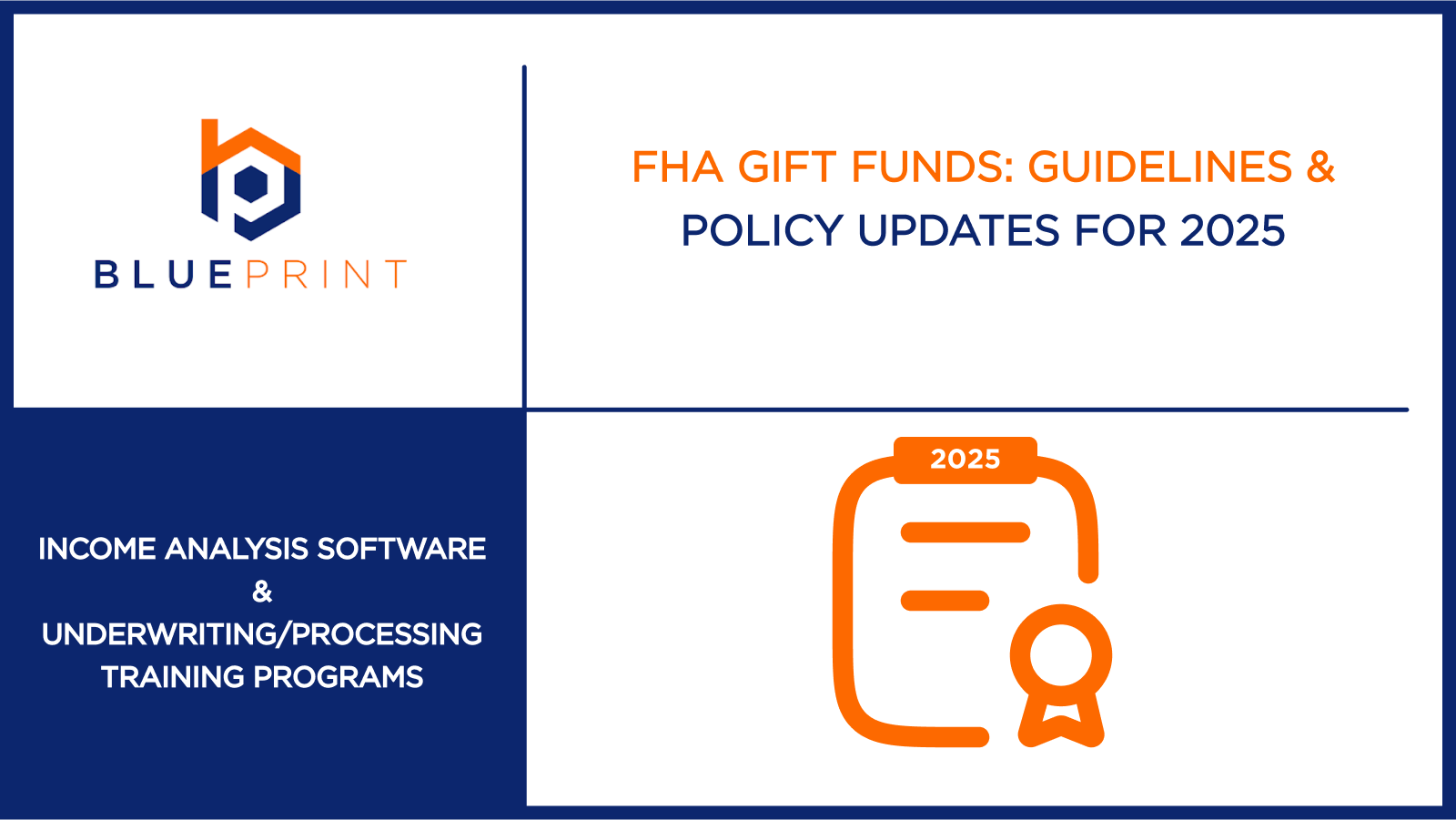In 2025, the Federal Housing Administration (FHA) continues to make homeownership accessible to first-time homebuyers and buyers with limited funds in their savings accounts. One way they do this is by allowing these borrowers to receive financial assistance through gift funds from eligible sources that can cover a portion or all of their down payment and closing costs. However, the use of these funds is subject to evolving guidelines established by the FHA.
In this article, we will review the current FHA loan requirements for gift funds, outlining acceptable sources, necessary documentation, and recent policy adjustments. We will also explore how technology solutions like IncomeXpert can help lenders navigate these regulations and facilitate a compliant loan process.
Main takeaways from this article:
- FHA gift funds enable eligible donors to help borrowers with home purchases, subject to specific guidelines regarding fund usage and minimum borrower contributions.
- For FHA loan approval involving receiving gift funds, a gift letter and verifiable documentation of payment funds transfer from an acceptable source are mandatory. This often requires the donor’s bank statement showing the transaction.
- Staying informed about the latest FHA policy updates and avoiding common documentation errors, as advised by the loan officer, are critical to ensuring a compliant loan process.
- Technology solutions like IncomeXpert can help lenders verify gift fund sources and streamline the documentation process to meet FHA requirements.
What are FHA gift funds?
FHA gift funds are monetary contributions made to a borrower by an eligible donor to assist with purchasing a home secured by an FHA-insured mortgage. The purpose of gift funds is to help individuals who might otherwise face barriers due to limited savings or income constraints buy homes. These funds, intended as a gift to the borrower, can be used for the down payment, closing costs, and other expenses associated with the home purchase, reducing the need for a home equity loan.
How do FHA gift funds work?
When a borrower intends to use gift funds for an FHA loan, a donor provides the specified amount to the borrower, typically before or at closing. Here’s how this arrangement works:
- First, the borrower receives the gift money from an eligible source, such as a family member or an approved organization.
- Then, the donor provides a gift letter affirming that the payment funds are a gift and do not require repayment.
- The borrower deposits the funds into their bank account (which must be documented), and the lender verifies the transfer and source before finalizing the loan.
This entire process requires thorough documentation to demonstrate the source of the funds and that they are indeed a gift in line with FHA standards to avoid delays or loan denials.
FHA loan guidelines for gift funds
The FHA has established guidelines governing the acceptance and use of gift money to maintain the integrity of the loan process and prevent potential issues such as undisclosed liabilities or conflicts of interest. These guidelines mandate:
- Minimum borrower contribution: For FHA purchases, borrowers must make a minimum investment of 3.5% when the loan-to-value (LTV) exceeds 90%. For LTVs of 90% or less, the required investment may be reduced or waived.
- Allowed uses of gift funds: Gift funds for an FHA loan can be used for the down payment, closing costs (like appraisal and title fees), and prepaid expenses (such as property taxes and homeowner’s insurance). However, they cannot be used for the borrower’s reserve requirements unless specifically allowed by FHA guidelines.
- Gifts must be truly “gifts”: FHA requires that these funds be genuine gifts with no expectation of repayment. If the payment funds appear to be a loan disguised as a gift, they will be ineligible for FHA loans. A gift letter is essential to confirm this condition, and lenders must examine the relationship between the donor and borrower to detect any conflicts of interest.
Acceptable sources of FHA gift funds

The FHA specifies the permissible sources from which gift funds can originate. These sources are generally individuals or entities with a close relationship to the borrower or those providing legitimate financial assistance, such as:
- Family members: FHA gift funds primarily come from family members, including parents, grandparents, siblings, children, aunts, uncles, nieces, nephews, spouses, domestic partners, and step-family members.
- Close friends with a documented relationship: In some cases, the FHA may also permit gifts from close friends with a clearly documented and well-established relationship with the borrower.
- Employer or labor union: An employer or a labor union may provide gift funds to an employee or member to assist with their home purchase. This is often part of an employee benefit program or a union initiative to support its members.
- Charitable organizations: Certain charitable organizations can provide gift funds if they are recognized as eligible under FHA policies. These organizations have a mission of promoting homeownership, and the documentation must include the organization’s name and proof of the gift.
- Governmental or public agency providing homeownership assistance: Various federal, state, or local governmental agencies and public entities offer programs to help individuals with homeownership through grants or gifts. These funds can be used for FHA loans if they meet the agency’s regulations and are properly documented.
FHA gift letter requirements for 2025
A critical document for using FHA gift funds is the gift letter. This document, signed by both the donor and the borrower, formally notifies that the funds are indeed a gift, not a loan. The FHA requires the following information to be included in the gift letter for it to be considered valid:
- The full legal names of the donor and the borrower
- The donor’s address and contact information
- The donor’s relationship to the borrower
- The exact dollar amount of the gift
- A clear statement that the funds are a gift and there is no expectation of repayment
- A dated signature from both the borrower and the donor
Documenting receipt and transfer of gift funds

Proper documentation of the transfer of gift funds is essential. FHA guidelines specify rules for the two primary methods:
The donor directly transfers funds to the closing agent
When a donor provides gift funds directly to the closing agent or escrow company, the required documentation should include proof of the transfer, such as canceled checks and bank statements. This approach provides clear evidence that the funds originated from the donor and arrived at the closing.
Donor transfers funds to the borrower
If the donor transfers the funds to the borrower’s bank account, the documentation should include a copy of the donor’s check or wire transfer confirmation and copies of the borrower’s bank statements showing the deposit of the gift funds. These statements should clearly identify the source and date of the deposit.
FHA gift fund policy updates for 2025
While no major guideline overhauls have been announced, FHA and lender overlays continue to emphasize
- Enhanced documentation requirements: To prevent delays, lenders are encouraged to obtain more detailed proof of transfer, including bank statements and wire transfer records.
- Stricter verification of donor relationships: FHA emphasizes the importance of documenting relationships, especially for non-family donors, to prevent potential misuse.
- Updated acceptable sources: Clarifications on acceptable charitable and governmental sources aim to prevent misuse of funds from non-traditional sources.
- Increased oversight on gift letter accuracy: FHA recommends that lenders verify the completeness and authenticity of gift letters to avoid discrepancies.
Common issues and mistakes with FHA gift funds

Identifying and avoiding common issues and mistakes that arise when using FHA gift funds can help prevent loan delays or even denial. These include:
- Missing or incomplete gift letter: A gift letter lacking essential details such as the donor’s relationship, amount, or signature can cause delays.
- Mismatched amounts between the letter and the transaction: The gift amount in the letter must align with the funds transferred and the amounts used for the down payment or closing costs.
- Unclear donor relationship: If the relationship between the donor and borrower is not well documented, the gift funds may be disallowed.
- Donor not an allowable source: Funds from sources outside FHA guidelines, such as unverified third parties, can lead to rejection.
- No proof of transfer: Failure to provide bank statements, wire transfer receipts, or canceled checks can prevent the funds from being verified.
Lender best practices for FHA mortgage approvals

While proper gift fund documentation is critical, it’s just one part of a fully compliant FHA loan file. To support overall approval and avoid issues during underwriting or post-close review, lenders should also follow these broader best practices:
Use standardized gift letters with complete transfer evidence
Employing a standardized gift letter template that includes all FHA-required information helps prevent omissions. Plus, proactively collecting and verifying complete documentation of the fund transfer, such as bank statements and wire transfer confirmations, is crucial.
Ensure income documentation is clear and consistent
While gift funds help meet upfront costs, borrower income must still be properly documented to support overall loan eligibility. Clear, guideline-aligned income documentation reduces the chance of delays or QC issues.
Track and organize borrower assets
Keep a clear record of all borrower assets, including accounts receiving gift funds. Organizing this data helps underwriters and reviewers verify financial readiness and ensure the gift was properly transferred and deposited.
Leverage technology to streamline compliance
Tools like IncomeXpert can help analyze bank statements and verify transfer details. Automating income and asset verification reduces manual errors and helps ensure every component of the loan file meets FHA compliance standards.
Keep FHA loan documentation clean and complete with IncomeXpert
FHA’s gift fund provisions offer flexibility for borrowers, but lenders must follow strict documentation guidelines to ensure compliance and avoid delays. Accurately tracking the transfer of funds, verifying the donor’s eligibility, and maintaining complete records are all essential parts of the process. Clear documentation is essential throughout the entire FHA loan process to ensure compliance and avoid delays.
Gift fund documentation is just one part of the equation. IncomeXpert complements the process by automating income verification and ensuring compliance with regulatory requirements. By streamlining income analysis, IncomeXpert helps lenders manage complex borrower profiles with greater accuracy and efficiency, enabling faster, more informed decisions and contributing to smoother loan approvals.
Request a demo to see how IncomeXpert supports faster, more compliant FHA approvals.

